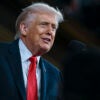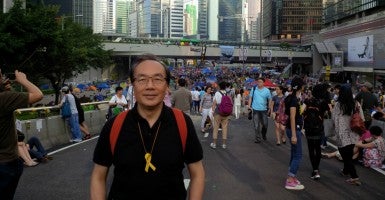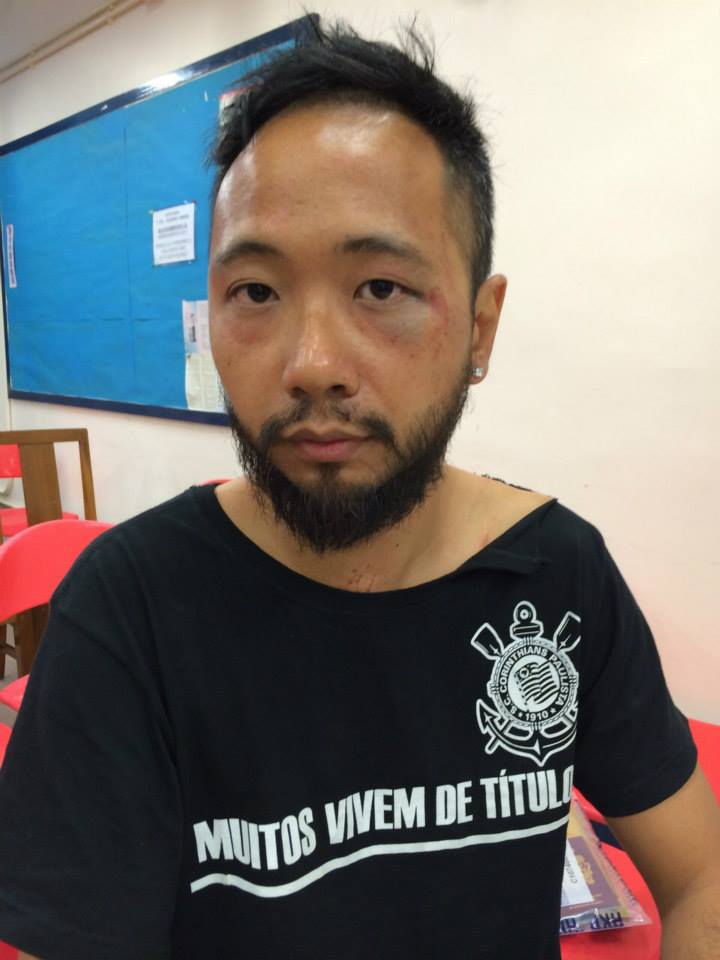Alan Leong, a leading pro-democracy legislator in Hong Kong, says he believes student protesters who flooded into the city over the past three weeks already have won — even if the government has given them nothing.
“The occupy movement was started with a view to draw the attention of Hong Kong’s public for the need of democracy to solve the deep-rooted conflict that has been haunting Hong Kong since the reversal of sovereignty [to China],” Leong, leader of the Civic Party of Hong Kong’s Legislative Council, told The Daily Signal in an interview yesterday via Skype.
Leong added:
I can say that up to now, short of three weeks into the movement, that objective has been accomplished. Many in Hong Kong who had not been aware of the need for democracy have now been informed to the necessity of a fairer political system.
Leong’s assertion took on added meaning after a video shot by a Hong Kong news crew today showed police officers kicking and beating a handcuffed demonstrator.
‘The Urgency of a Dialogue’
The man who was beaten, Ken Tsang, is a member of Leong’s Civic Party and a volunteer social worker who specializes in projects for street children.
“[The incident] showed that at least some police officers are not holding up in the way they should,” Leong said today in an email to The Daily Signal. “We would certainly follow up on it by making sure that the offenders will be brought to justice. At the same time, I hope those in power will feel the urgency of a dialogue with students to resolve the impasse.”
>>> Protesters Return to Streets as Hong Kong Leaders Cancel Talks
The video is accompanied by photographs of Tsang’s bruised body. The images put a personal face to accusations that pro-democracy demonstrators have been mistreated by an over-aggressive police force.
Police spokesman Hui Chun-tak told reporters at a news conference that seven officers participated in the violence, including two holding the rank of inspector. He said authorities would conduct “an impartial and fair investigation.”
During a regular meeting of the Hong Kong Legislative Council today, Leong initiated a discussion about enlisting an independent panel to investigate police handling of the protests that began Sept. 28.
He also wants his fellow legislators to debate how the Hong Kong government has dealt with the events, and why it didn’t stop criminal “triad” gangs from attacking protest camps last week.
Lasting Impact
Leong’s quest for answers helps explain why he doesn’t believe the impact of the protest movement will fade when students leave the streets. He said:
After 87 shells of tear gas, and tolerating triads, we have not heard even a single sentence from the chief executive or those responsible that is apologetic It seems they think we are the only one in the wrong. That is what is most off-putting and preventing the occupy crowd from dispersing.
>>> Hong Kong’s Former No. 2 Official Fields 7 Questions on the Future of Her City
Demonstrators have demanded the resignation of Leung Chun-ying, Hong Kong’s current chief executive, or top city leader, and insisted on the democratic election of his successors as well as all lawmakers.
The reform would allow voters, not a committee aligned with Communist leadership in China, to pick candidates.
The government abruptly pulled out of peace talks with protest leaders last week, after it had promised to meet with them.
Leong, the Civic Party’s nominee for chief executive in 2007, said the government’s refusal to negotiate is especially unacceptable considering the good behavior of protesters.
>>> The Shockingly Brutal Beating of a Hong Kong Protester
“I have spoken to a lot of foreigners, and one observation by all of them is that had anything like this happened in their home country, they expected there would be a lot of looting, social disorder and chaos,” Leong said. “So far, there has not been a single shop window broken.”
Leong said he meets every day with protest leaders to discuss their needs.
His say is limited, though, because only 27 of the 70 seats in the Hong Kong Legislative Council are held by legislators from pro-democracy camps. Parties aligned with China control most seats.
Demonstrators continue to demand that they get universal suffrage in the choice of their leader, as promised when Britain handed Hong Kong over to China in 1997, Leong said.
Taking Stock
On Aug. 31, China’s legislature announced changes to the electoral process, deciding that candidates must be endorsed by more than half of the members of an election committee whose members are considered pro-Beijing.
Even if Hong Kong and Beijing won’t change that policy, Leong considers dialogue to be important.
“Once you have start the talks, there are different things you can do,” he said.
One thing the government could do, with the endorsement of Beijing, he said, is have Chun-ying produce a report about the events in Hong Kong since China’s Aug. 31 decision.
“Based on the that, the standing committee [China’s leadership] can revisit its decision,” Leong said.
>>> China Cuts Off News of Hong Kong Protests
If that doesn’t fly, he said, talks initiated by the Hong Kong government would signal goodwill to the protesters, who then might be swayed to return to their homes at least temporarily.
“That would provide some time and space for maneuver,” Leong said.
He said protesters should continue to demonstrate until the Hong Kong government shows flexibility, even if that means inconveniencing the business community — and the Legislative Council.
“I think it is important for us to take stock now and to preserve the public’s support for the democratic movement,” Leong said, adding:
I am not saying they should leave [the streets] now because the government hasn’t even apologized. But this cannot be procrastinated for too long, at least so long to make us lose the sympathy we have won so far. Hopefully, at the end of it all, we could get from those in power a fairer system so our younger generation can have some hope.






























